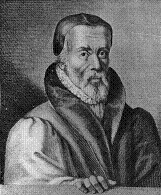LOST IN TRANSLATION
Why did Henry VIII wish for the noted Bible translator and Protestant reformer William Tyndale to be executed?
 WILLIAM TYNDALE, bom in Slimbridge, Gloucestershires, in about 1496, was educated at Magdalen Hall, Oxford, where he became chaplain.
WILLIAM TYNDALE, bom in Slimbridge, Gloucestershires, in about 1496, was educated at Magdalen Hall, Oxford, where he became chaplain.
While there, he assimilated the ideas of John Wycliffe and the Lollards, convinced that the Church had become corrupt.
In 1524, Tyndale went to Hamburg, where he met Martin Luther, and the following year moved to Cologne, where he arranged for his translation of the Bible to be printed in English.
Over the next few years, 18,000 copies of this Bible were printed and smuggled into England. In 1530, Henry VIII gave orders that all English language Bibles were to be destroyed. People caught distributing the Tyndale Bible were burnt at the stake.
Tyndale spent much of his later life in hiding, writing revolutionary documents. He was betrayed while in Belgium and burned at the stake there as a heretic in 1536 when the Protestant Reformation was still in its infancy.
Translations of the Bible into English, or any other language other than Latin, were viewed with horror by the Vatican and the various Catholic heads of state, who hated the idea of ordinary people being able to read the Scriptures for themselves.
All tyrants and totalitarian regimes in history have tried to suppress not only the Bible but any literature or ideas that help people think independently.
Henry VIII was no exception and would certainly not have approved of Tyndale.
It’s a common misconception that Henry VIII became a Protestant when he broke with Rome. He did not! Though he ceased to acknowledge the Pope’s authority, he remained essentially a Catholic.
His sacking of the monasteries was a political and economic move because they had power, influence and great wealth.
It is often said he became the first head of the Church of England, equating this with the modern Anglican Church, but it’s more correct to say he appointed himself head of the church in England, in place of the Pope, which is different.
Hastings, East Sussex. 2009 England

